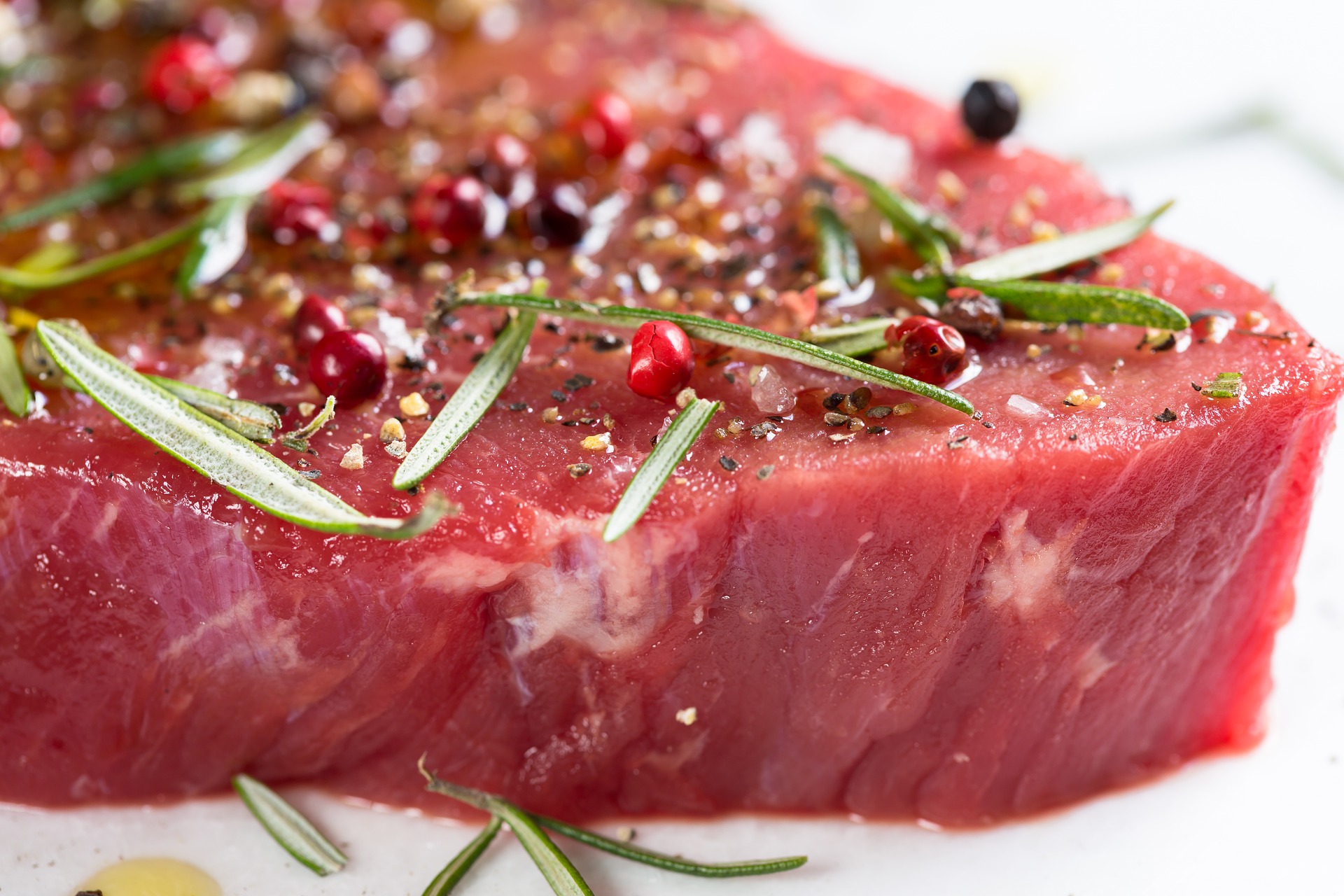Let's stay in touch
Keep in touch with us and stay up to date with latest in the world of healthcare and gut health!
Large intakes of red meat can affect the health of your kidneys, liver, heart and gut.
Research shows that it’s good to avoid excessive consumption of red meat because the processed ingredients have been linked to cardiovascular disease and bowel cancer. The high saturation of fat and cholesterol in red meat has been proven to increase the risk of heart disease, and N-nitroso chemicals have been shown to damage the lining of the bowel.
Try to stick to the recommended serving of red meat each week. Otherwise you might experience gout attacks, indigestion and bloating.
The digestion of meat rich meals takes the body 8-12 hours to process. That’s at least two hours and a whole lot more effort than the average meal takes. A reduction in your red meat intake can alleviate heartburn, a bloated stomach, and prevent stomach cramps.
Processed meats like salami, bacon and hot dogs (frankfurts) have been strongly linked to cancer. The added chemical ingredients that enhance taste and shelf life are not so good for your health.
If you limit the amount of processed meat in your diet, you’ll encourage the good bacteria in your gut to flourish. You’ll also be minimising the intake of damaging N-nitroso chemicals. This will benefit overall bowel health, and help you to steer clear of Irritable Bowel Syndrome (IBS).
Look for ways to replace processed meat with healthier, low fat meat cuts. Check that your meat portion sizes are moderate. Try tasty alternatives like chicken, mushroom or eggplant that can replenish the Vitamin B12 and iron that you’d otherwise find in red meat.
See what it’s like to replace a meal a day with a vegetarian or vegan substitute. This simple step can improve your gut health and reduce the risk of cancer and heart disease. Foods that are rich in vitamin B12 and iron are natural remedies for indigestion and gut discomfort.
There is a range of non-meat foods that can support you to meet your daily protein requirements. Eggs, nuts and seeds are healthy diet ingredients that improve gut health. These protein sources deliver bonus rewards like increased energy and healthy fat components.
Many food groups contribute to poor gut health. But the connection between gut health and red meat consumption has certainly captured the interests of researchers who have proven the links. We now understand well how gut health is affected by excessive red meat intake.
You can take positive steps to better balance your gut health by planning your weekly meals.
Shop for a range of ingredients that will support a balanced diet. Introduce a few vegetarian menu options to break up heavy meat dishes throughout the week. Meat Free Monday could be a fun tradition to bring to your kitchen table. With just a little effort you can prevent symptoms of bloating, gas, indigestion and improve overall gastrointestinal health.

On the days that you eat meat it is a good idea to boost your water intake to aid digestion. Have a few extra glasses to keep your system well hydrated. This will help your body to process meat more efficiently, with less effort and discomfort.
Room temperature is more effective than cold water to aid hydration and digestion, especially when you’ve eaten rich foods like red meat.
If you drink cold water the body requires extra time and additional energy to warm the water before it can even get to work digesting your food. Consuming room temperature water also decreases bloating because the body, and your gut in particular, can hop straight to the job of processing food without distraction or reaction.
If you want to add another positive lifestyle habit, Nutrition Care has the simple solution to boost gut bacteria and aid your dietary intake.
Our unique NC Gut Relief powder is a comprehensive herbal nutritional formula that helps maintain gut integrity and function.
Checkout our convenient Store Locator to discover where you can pick up our NC Gut Relief 150g Powder as an additional way to get good gut health.


SAMe is a compound best known for its antidepressant action. In this article, we seek to touch on the significant body of evidence that supports


Ingredients (4 serves):• 500g carrots, grated. (Ideally organic)• ½ red onion, finely sliced• Zest & juice of 1 lemon• 2 tsp toasted cumin seeds• 2cm




观看由创办人 Ian Brighthope教授为大家回顾了 Nutrition Care 的历史,並向大家保证将会继续坚持纯自然和更专业的理念,为世界人们提供高质量的保健品。


2018年4月26日,Nutrition Care在墨尔本举办庆典庆祝品牌创立40周年。 Nutrition Care是澳洲著名的保健品生产商,其创立于1978年,40年来一直致力于减少药品的使用。而此次40周年庆典的主题——自然更专业,也是他们长久以来希望传达给消费者的理念。26日下午1点半,Nutrition Care的40周年庆在墨尔本的Crown正式拉开序幕。 (著名主持人李维嘉,品牌创始人Ian Brighthope,澳洲名模Lauren Vickers) 此次庆典上,Nutrition


5月13日,Nutrition Care首次冠名全澳大学生华语辩论赛——NC纽新宝杯决赛于墨尔本市政厅成功举行! 本次辩论赛由澳洲著名保健品品牌NC纽新宝独家冠名,活动到场嘉宾有中国驻墨尔本总领事馆教育组杨智勇领事,本次评委阵容亦相当强大,其中就包括《奇葩说》著名辩手陈铭与胡渐彪 。 决赛双方分别是莫纳什大学中文辩论社和墨尔本大学中华辩论社,双方就【消费主义是当代灵魂的良药还是毒药】这一辩题,站在不同的角度,深度剖析。 最终,莫纳什大学代表队的表现获得了评委们的一致青睐,夺得本届全澳辩论赛中冠军。 比赛结束后,胡渐彪评委深入浅出解读【良药】【毒药】的定义,给辩手和台下观众们带来更深层次的思考。徐卓阳评委更是以赞助商NC纽新宝在台上的养胃粉为例,幽默而又直观地对话题进行了概括,通俗易懂,却又发人深思。Nutrition Care品牌创始人Ian Brighthope虽不能亲自到场,但特意录制了一段祝贺视频给参赛选手们。视频中Ian教授感谢选手们的付出,在母亲节这样特殊的日子里,他提醒远离家人的留学生们,要注意自己的身体健康,因为健康对他们而言,是在异乡追逐人生梦想最重要的急事之一。 最後,NC纽新宝为嘉宾、评委们以及每一位前来参加活动的观众准备了养胃小礼物,让大家在观 看辩论赛时感到暖心暖胃。
Keep in touch with us and stay up to date with latest in the world of healthcare and gut health!
| Cookie | Duration | Description |
|---|---|---|
| cookielawinfo-checkbox-analytics | 11 months | This cookie is set by GDPR Cookie Consent plugin. The cookie is used to store the user consent for the cookies in the category "Analytics". |
| cookielawinfo-checkbox-functional | 11 months | The cookie is set by GDPR cookie consent to record the user consent for the cookies in the category "Functional". |
| cookielawinfo-checkbox-necessary | 11 months | This cookie is set by GDPR Cookie Consent plugin. The cookies is used to store the user consent for the cookies in the category "Necessary". |
| cookielawinfo-checkbox-others | 11 months | This cookie is set by GDPR Cookie Consent plugin. The cookie is used to store the user consent for the cookies in the category "Other. |
| cookielawinfo-checkbox-performance | 11 months | This cookie is set by GDPR Cookie Consent plugin. The cookie is used to store the user consent for the cookies in the category "Performance". |
| viewed_cookie_policy | 11 months | The cookie is set by the GDPR Cookie Consent plugin and is used to store whether or not user has consented to the use of cookies. It does not store any personal data. |




Get free shipping on your first order* when you enter your details below.
*A minimum purchase of $25 is required. Always read the labeland follow the directions for use.